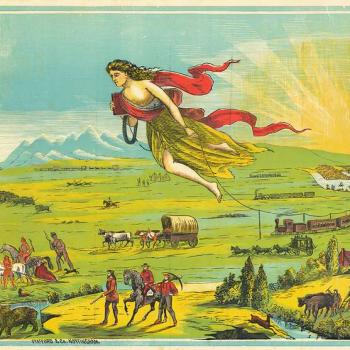Columnist Paul Greenberg has written a wonderful column about It’s a Wonderful Life. Read it all. After the jump, I excerpt his points about how the movie deals with some distinctively American themes. He also cites a critic who thinks it’s tragic that George Bailey had to give up his big dreams because of the responsibility he felt for his family and his community, a reaction that is tragic in itself.
From Paul Greenberg: It’s a wonderful life | News OK:
The finished product turned out to be more than a Christmas carol, for it also celebrates so many other themes dear to the heart of a certain species of American, a corny breed to which some of us still belong. Let us only begin to list “It’s a Wonderful Life’s” appeals:
- The combination of community and individualism, each re-enforcing the other to produce a quality in American society that neither could sustain alone.
- The work ethic and all the other Puritan values that go with it — from delayed gratification to constancy of faith and ever-present purpose.
- America’s image, and reality, as a nation of immigrants.
- Love and marriage and family.
- Small towns and great dreams.
The movie weaves all those themes together in a chiaroscuro of light and dark, for this story is not without its disillusions and disappointments, too, complete with a stony-hearted villain — Old Man Potter, the very image of a Scrooge, but one who never saw the light.
“It’s a Wonderful Life” still resonates with socio-economic causes, and political ones, too, that remain relevant even now. Like the contrast between old-fashioned local banking rooted in the community (like Bailey Building & Loan in the movie’s Bedford Falls) and the kind of mega-banks and global conglomerates-cum-hedge funds that brought on the Panic of 2008-09 and the Great Recession that followed. . . .
Some critics might not agree. Years ago I ran across a Critical Analysis of “It’s a Wonderful Life” by a professor of American Studies at Boston University, bless his heart, who gave the film a thumbs down. Why? As he explained, while the movie shows that life can be “an enriching Norman Rockwell experience, it also can be smothering, where you end up marrying the girl you went to high school with, and you never get to go to Europe. . . . It tells us George (Bailey) is one of the most sad and lonely and tragic characters ever imagined. I cry when I see it.”
The movie makes a lot of other folks shed tears, too, but not for the professor’s reasons. They’re the kind of tears that come on the happiest of occasions — like weddings and birthdays and Christmases. Nothing in the movie is as sad as the professor’s opinion of it.










